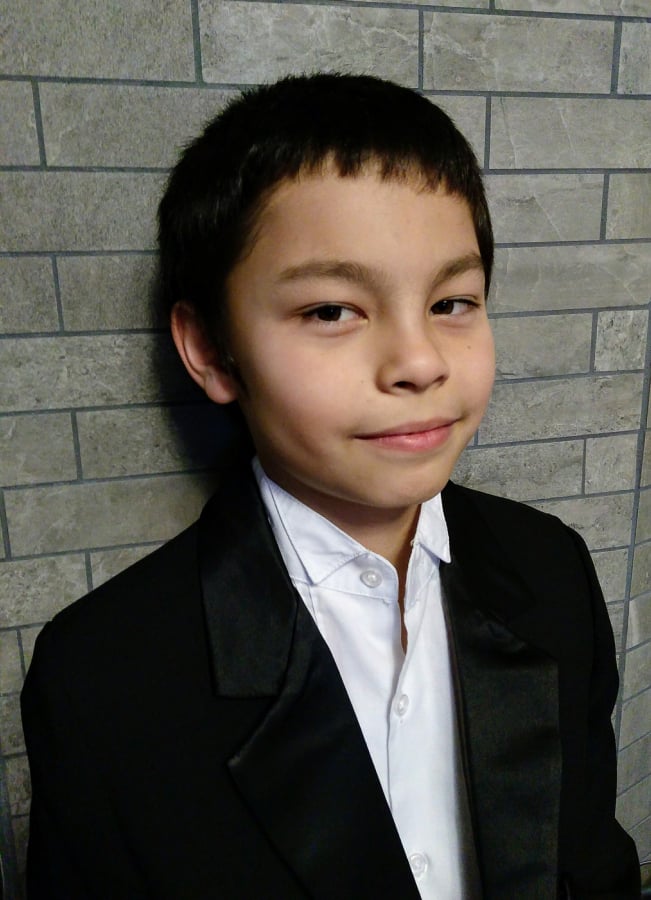Dedication and drive are just two words that come to mind when describing the gold medal winners of the Vancouver Symphony’s Young Artists Competition. They have dedicated an incredible amount of time to practicing, focusing on technique, and developing their artistry, which they will put on display as they take the spotlight to perform with the orchestra in this weekend’s concerts.
The youngest winner, and perhaps the youngest gold medalist ever in the 25-year history of the competition, is flutist Julin Cheung, an 11-year-old sixth-grader at Ridgecrest Elementary in Shoreline. Despite his age, Julin has already won several first prizes, including the 2018 Severino Gazzelloni Flute Competition in Pescara, Italy.
Julin can recall exactly when he became interested in the flute.
“One day, while I was in the car,” said Julin, “we were listening to our local classical music station, and I heard James Galway play Rimsky-Korsakov’s ‘Flight of the Bumblebee.’ ”
So at age 6, Julin began lessons, and he has now played for Galway three times in master classes.
If You Go
What: Young Artists Competition winners to perform Vivaldi, Ravel and Rachmaninoff.
When: 3 p.m. Saturday and 7 p.m. Sunday.
Where: Skyview High School Concert Hall, 1300 N.W. 139th St., Vancouver.
Cost: $50 reserved seats, $38 general admission, $34 seniors and $10 students.
Julin will play Antonio Vivaldi’s Second Flute Concerto, which is known as “La notte” (The night).
“The Vivaldi is comprised of six movements,” remarked Julin. “None of them are very long, so the piece doesn’t get boring. Each movement has its own quality and technical challenges. It’s fun to practice and play. There are fast and energetic movements, and they are contrasted with slower, gentle movements.”
Before a big concert or recital, Julin will spend at least four hours per day practicing. Otherwise, he cuts it back to two or three hours a day. His teacher is Demarre McGill, principal flutist of the Seattle Symphony.
The winner in the keyboard category is 16-year-old Jenna Tu, a junior at Mountain View High School in Vancouver. Tu will perform the first movement of Rachmaninoff’s Second Piano Concerto at the Vancouver Symphony concert.
“Rachmaninoff’s Second is one of my favorite concertos ever,” said Tu. “The first movement is very passionate and has beautiful melodies.”
Tu knows the concerto very well. She played the third movement last year with the Central Oregon Symphony and the Coeur d’Alene (Idaho) Symphony.
Even though she is a veteran winner of competitions, Tu acknowledges that she can feel her nerves when she walks out on the stage.
“But once I start playing, all of the nervousness vanishes,” said Tu.
Tu was initially drawn to the piano because of her mother.
“My mom plays flute and piano,” recalls Tu. “When I was a kid, she would play CDs at home. I especially remember Beethoven and Mozart sonatas. Because of that I really liked classical music from a young age, and I wanted to learn. So I started lessons when I was 6.”
A student of Renato Fabbro, Tu practices around two hours every day and usually gets in more time over the weekends. Her dedication has taken her to Weill Recital Hall, which is a part of Carnegie Hall.
“That was my first time in New York City. It was wonderful to be with people who are as passionate about music as I am.”
Aaron Greene, a 17-year-old senior at Union High School in Camas, won the strings competition and will play “Tzigane,” a Gypsy-inflected piece by Maurice Ravel.
“The Ravel is by far my favorite piece,” said Greene. “It is one of those pieces that is focused on both the player and the audience. There is a lot of freedom to express the music. The first three minutes are a solo violin cadenza. The rest of the piece is super-exciting. I have played it for about a year-and-a-half on-and-off.”
Greene has taken violin lessons for the past nine years and currently studies under Carol Sindell, whom he credits as a major reason for his artistic growth. This season is his fifth and final one with the Portland Youth Philharmonic and his second as one of its concertmasters.
According to Greene, neither of his parents are musical, but that didn’t stop his mother.
“My mom thought that my sister and I were kind of bored,” he remarked. “So she started both of us on violin and piano. I quit the piano a few years later to focus on the violin. It’s been really fun. I practice one to four hours every day, and that increases when I have a competition coming up.”
In the fall, Greene will go to Stanford University, where he intends to take classes in economics and statistics. He also expects to play in the university’s orchestra and participate in chamber ensembles.
The big number on the concert program will be Nikolai Rimsky-Korsakov’s “Scheherazade,” one of the most beloved orchestral works of the Romantic repertoire. It has swashbuckling and exotic music that is based on stories from “One Thousand and One Nights.” The emotional content of the piece will be like putty in the hands of Music Director Salvador Brotons.



